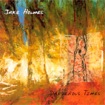
Jake Holmes: Dangerous Times (Private Pressing)
That a new set of songs from Jake Holmes should have slipped without fanfare into the wider world is remarkable, a little sad, but of no real surprise. Holmes, not exactly a name of the household variety, hadn't released an album for thirty years. That Dangerous Times is superbly crafted, sounding like the sort of distinguished fare reviewers dust down their cliches for when delivered by young pretenders (Holmes was born in 1939) isn't a big deal either. Good records come and go, and as good things go, this one went nowhere.
Holmes recorded five solo albums from 1967 through 1971, for labels as diverse as Tower, Polydor, and Columbia. Sophisticated efforts, they gained respect but not sales. He wrote an album of songs for Sinatra (Watertown), undertaking similar labors for the Four Seasons and Harry Belafonte. He also authored "Dazed and Confused," the song Led Zeppelin made their own, the only problem being, it wasn't theirs in the first place. They've maintained their audacity, and their guilt, by never coming clean.
As careers unfold, Jake Holmes, more than most, has had a varied one. From working in comedy revues with Joan Rivers (who, he fondly recalls, "couldn't carry a tune in a bucket") in the early '60s to a folkie excursion with Tim Rose, he has been things and seen places. His 1967 debut for Tower Records, The Above Ground Sound of Jake Holmes, a brilliant slice of psych that contains the stolen song, had just been released when Holmes appeared at the Village Theater in Greenwich Village on August 25 to support the Yardbirds. He performed "Dazed and Confused," the moment, as he stated in an interview with Will Shade, that the song fell into "the loving arms and hands of Jimmy Page." Initially part of the Yardbirds' subsequent live sets, it eventually surfaced a few years later on Led Zeppelin's debut, uncredited as Holmes's, instead claimed as theirs. Although Holmes took no immediate action, he did years later send a letter to Jimmy Page in which he humbly requested acknowledgment and recompense. A reply is, as of yet, unforthcoming. If you know both versions, the steal is plain and clear, and if you don't, it remains Jimmy Page's finest hour.
As John Bramwell of I Am Kloot recently retorted on the subject, "It doesn't bloody surprise me. They always were nothing more than a fucking covers band, anyway!"
With hindsight Jake Holmes could afford not to worry, but despite the excellence of his next album, A Letter to Katherine September, he wasn't proving a popular success. Then the Sinatra project came, and three further albums, two on Polydor and one for Columbia. All failed to do much business.
He went on to become a prolific and hugely successful jingles writer whose clients have included. Pan Am, Gillette, and Burger King. He also continued to write songs, as much for pleasure as for any specific purpose. With nothing to prove, and no one to please, Dangerous Times therefore stands as a rare and honest joy. The title track and opener is a big ballad delivered in downplayed fashion. Touching and eloquent, Holmes decries the loss of "the courage of innocence" in a song that has garnered additional pathos in the light of subsequent world events. There are tones and echoes of Tim Hardin's "Suite for Susan Moore," especially in the intricate and hauntingly eloquent "Dust," which contains the uneasy contradiction of being a thing of beauty about hunger and privation: There's no more left of me to drink. There's no more left of me to weep. Close your eyes and we'll go home. Sleep now, go to sleep. "Miles," a beatnik poetry rap about the late trumpeter, all poetic Kerouac, drifts along with easy eloquence. Almost African in feel, "Silence" proves an afternoon delight that nails with assured politeness the need of others to proclaim their faith. Beneath the scripture is what I seek. Silence is the language my God speaks Holmes is not afraid to risk singing alone. Totally unaccompanied on "The Wall," he performs a clear vocal, avoiding affectation; it proves his voice a subtle instrument of refinement, mesmerizing and assured yet vulnerable. "Orphan" employs the same textures and tones as the songs on his Columbia release How Much Time:
"She loves like an orphanShe's only sure of her enemy...She's never fooled by sincerity"
Jake Holmes has quiet genius, and this tender exercise betrays it with aplomb. Reflective but astutely aware, although several summers old, it would make a perfect soundtrack for this one. Ending on a sinister note, "Another Night" requests with barbed irony:
"Give me your tired, your poor
Your huddled masses
And we'll take care of them."
Just like Jimmy Page took care of "Dazed and Confused." Were Jake Holmes a lesser individual, that theft could have colored all his subsequent living. That he just got on with life, and successfully so, reveals a special nature, which is why Dangerous Times, an album recorded at an age when most have rehearsed retirement to tedium, remains one worth hearing.
